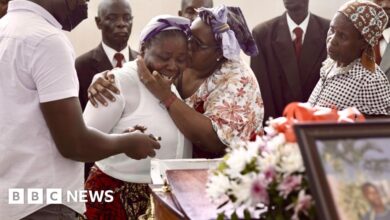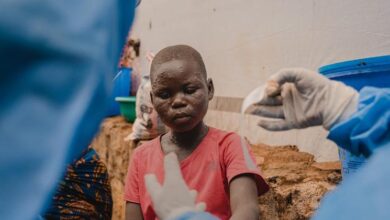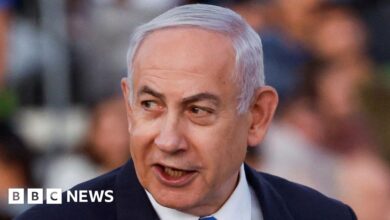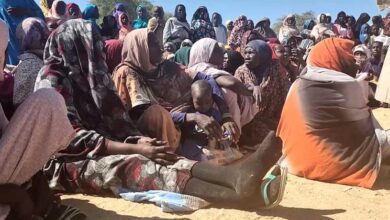BRICS Summit: Guterres emphasizes the bloc’s role in promoting global cooperation
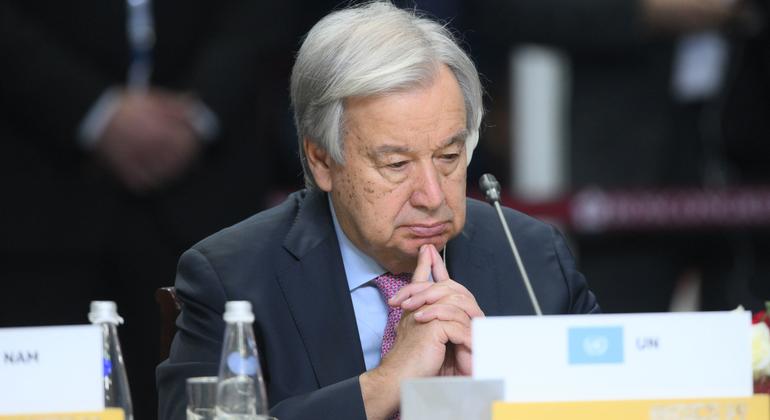
He called on the bloc to help build a fairer global financial system, promote climate action, improve access to technology and work towards peace, especially in Gaza, Lebanon, Ukraine and Sudan.
BRICS was established in 2006 by Brazil, Russia, India and China, followed by South Africa, Iran, Egypt, Ethiopia and the United Arab Emirates. Collectively, they represent nearly half of the world’s population.
Solving global challenges
Mr. Guterres appreciated their commitment and valuable support in resolving international issues.
“But no group and no country can act alone or in isolation. It takes a community of nations working as a global family to solve global challenges,” He speak.
These include increased conflict, climate change, rising inequality and persistent poverty, as well as “a debt crisis that threatens to stifle the plans for the future of many vulnerable countries.” ”.
Furthermore, less than 1/5 of 17 Sustainable development goals (SDG) is on track, the digital divide is widening and agencies such as the United Nations Security Council and the Bretton Woods institutions lacked representation of developing countries.
Pact for the future
Emphasizing that “this must change”, Mr. Guterres pointed out Future Summitheld at the United Nations in September, to provide a roadmap to strengthen multilateralism and promote peace, sustainable development and human rights.
The leaders adopted one Pact for the future including sustainable development, international peace and security, science and technology, youth and future generations, as well as transforming global governance.
Global Digital Compact And Statement about future generations is in the appendix.
“Female Future Summit has outlined a roadmap to strengthen multilateralism for global development and security. Now we must turn words into action and we believe that BRICS can play a very important role in this directionhe said.
Reforming the global financial structure
Mr. Guterres outlined four areas of action, starting with finance.
He said the Pact for the Future calls for accelerated reform of the international financial architecture, which is “outdated, ineffective and unfair”.
It also includes a commitment to moving forward with one SDG stimulus plan Support developing countries by significantly increasing the lending capacity of multilateral development banks.
“The Conference on Financing for Development and the Summit on Social Development next year are two important milestones to advance these efforts,” he said.

Women wade through floodwaters in a neighborhood in Kinshasa, Democratic Republic of Congo. (document)
Ambitious climate goals
Referring to the issue of climate change, Mr. Guterres emphasized the need to take “drastic action to reduce emissions now” to limit global temperature increases to 1.5 degrees Celsius.
He said the UN’s COP29 climate conference in Azerbaijan next month “starts the clock for countries to come up with new Nationally Determined Contribution plans with 2035 targets in line with target 1.5 degrees.”
He added that the conference “must deliver an ambitious and credible outcome on the new climate finance target”. Besides, Developed countries must keep their promise to double their resilience and financing, while ensuring meaningful contributions to Loss and damage fund.
Access to technology
Meanwhile, every country must be able to access the benefits of technology and the Global Digital Compact commits to strengthening international cooperation and capacity building in this area.
“It includes the first truly universal agreement on the international governance of Artificial Intelligence give every country a seat at the AI tablehe said.
“It calls for the establishment of an independent International Scientific Council on AI and the initiation of a global dialogue on AI governance within the United Nations with the participation of all nations.”
Furthermore, the Treaty requires innovative funding options to build AI capacity in developing countries, he added.

A family walks past a destroyed mosque in Gaza.
‘We need peace’
Regarding his final position, Mr. Guterres said the international community “must strengthen and update the peace apparatus,” including making the Security Council more reflective of today’s world.
He noted that the Treaty for the Future includes important steps on disarmament. This includes the first multilateral agreement on nuclear disarmament in more than a decade, as well as steps to address the weaponization of outer space and the use of lethal autonomous weapons.
“In every aspect, we need peace,” he said.
“We need peace in Gaza with an immediate ceasefire, the immediate and unconditional release of all hostages, the delivery of effective humanitarian aid without hindrance, and we need to make progress. irreversible steps to end the occupation and establish a two-state solution, as it was recently reaffirmed again by a United Nations General Assembly resolution.”
Peace is also needed in Lebanon, with an immediate cessation of hostilities, progress towards full implementation of the agreements United Nations Security Council Resolution 1701 (2006).
Read our explanation of resolution This.
“We need peace in Ukraine. A just peace is consistent with UN Charterinternational law and General Assembly resolutions,” he continued.
“We need peace in Sudan in which all parties are silent and committed to the path towards sustainable peace.”
The Secretary-General recalled that these were the same messages he sent to the high-level segment of the United Nations General Assembly in September.
“Unfortunately, they are still in effect here and now,” he said. “Everywhere we must uphold the values of the United Nations Charter, the rule of law and the principles of sovereignty, territorial integrity and political independence of all nations..”

